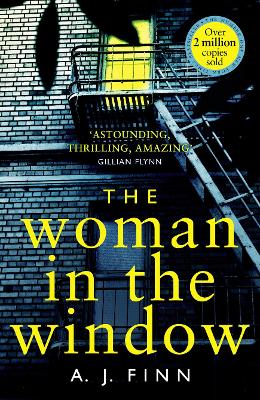Reviewed by Quirky Cat on
I was originally debating about whether or not I wanted to read this novel, and it was the description that actually sold me on it. I absolutely adore the concept of having an entire thriller exist in a small space - in this instance its Anna Fox’s house and its immediate surroundings. It’s not something I’ve really seen implemented before, so it piqued my curiosity.
Have you ever read a book that’s being highly praised, and just been completely baffled by why it’s so popular? That was how I felt after having read The Woman in the Window. I keep seeing people call it ‘the book of 2018’ (which is silly to me, as it’s only February), and I just don’t get it. Sure, it was a decent read, but there were some pretty big plot-holes as well. Not to mention it wasn’t terribly kind to those with mental health issues.
Anna Fox is an agoraphobic child psychologist - try saying that ten times fast. After an incident (which slowly unveils itself during the course of the novel) Anna finds herself to terrified to leave the safety of her home. One would think a psychologist of her level would have the tools required to help her, but of course the mind isn’t that simple. On the bright side, Anna is actually seeking professional help, but she also breaks a lot of big rules in the world of psychology, and it ended up grating on my nerves.
Rule number one; don’t mix medications (anti-anxiety, anti-depressants, sleep aids, etc) with alcohol. Alcohol combined with any one of the medications she’s on would be a recipe for trouble, but drinking (in excess) while on a plethora of medications is just stupid and dangerous. Anna of all people should know better, considering her background. But without the drugs and alcohol combination we don’t get the obscuring of the truth (is Anna hallucinating, or did she really see that?) or the doubt from other characters (whom had reason to be concerned about what she saw, even if they shouldn’t have allowed this concern to affect their judgment or demeanor).
Rule number two; don’t practice medicine online, through unofficial means. I know there are doctors (both medical and psychological) that practice online, but guess what; they have to be licensed to do that. From what I can tell, Anna does not. I understand that her heart is in the right place, but she’s opening herself up to some pretty major lawsuits by admitting that she’s a psychologist and giving advice the way she is (including suggesting which medications to be taking). It’s a shame we have to think about it like that, but it’s the world we live in I guess.
These two rules are broken constantly throughout the novel, which of course meant it was always bugging me (and breaking my immersion, if I’m being honest). I think I might have been willing to overlook either one of them on their own (it is just a book, after all), but for me the combination signaled that the author was doing it intentionally, which resulted in me suspecting at least part of the impending twist.
There are several points from the start of the novel that leave the reader curious, begging for any scrap of detail possible. Throughout the novel these stories are slowly revealed, bit by bit. While some of them were really fascinating and well done, others I felt were not worth the time it took to built them up. One in particular (being vague for the sake of those that haven’t read it, but those that have likely know exactly which one I mean) was particularly frustrating for me, as I felt it broke the promise. It made me feel lied to, as there was really no way for us to see this point forming (other than gut instinct, I suppose). I don’t resent the twist itself, just the way it was handled.
As for the major and final reveal, I call bull. There’s no way that particular character (again, being vague on purpose) could have gotten to that point without giving away any signals; especially not to a trained and talented psychologist. Yes, yes I know, lots of drinking and drugs, but come on. The suspension of disbelief that’s being asked is just too much for me. I was just so disappointed in the ending, and ultimately that’s the reason I can’t rate it higher than I have.
I would like to point out that while I didn’t love this novel, the writing style itself was actually wonderful. While all of the revelations didn’t pan out (in my opinion), I did greatly enjoy the buildup. I still love the concept of having the whole story take place in one setting; I would love to see more of that. Hopefully the author explores this concept further.
For more reviews, check out Quirky Cat's Fat Stacks
Reading updates
- Started reading
- 4 February, 2018: Finished reading
- 4 February, 2018: Reviewed
